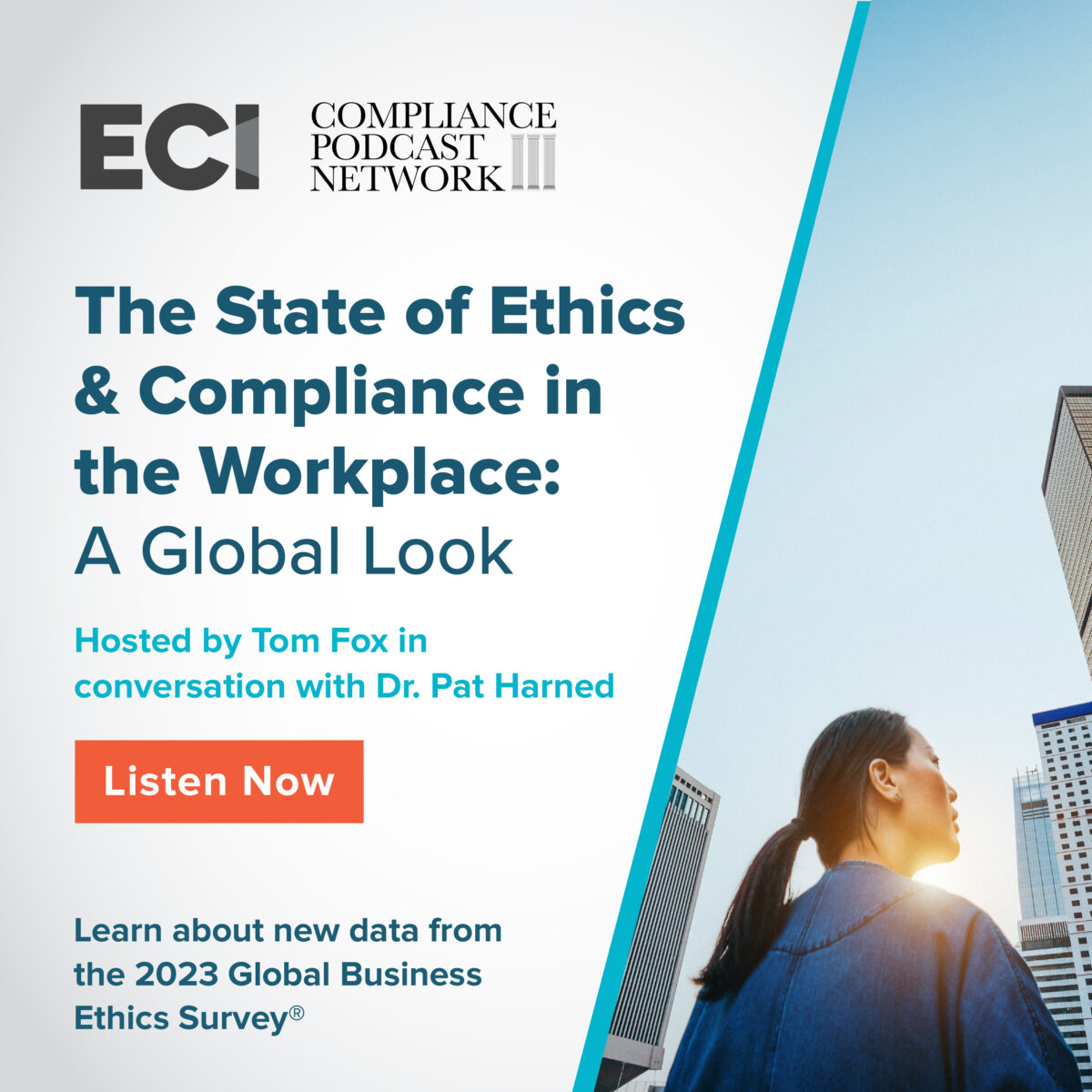In a recent ECI podcast series, I had the opportunity to visit with Pat Harned, CEO of ECI. We took a deep dive into the 2023 Global Business Ethics Survey (GBES), which revealed concerning trends in workplace ethics. The survey highlighted increased employee pressure, misconduct, and retaliation against whistleblowers. These findings underscore the need for organizations to implement robust ethics and compliance programs, including formal anti-retaliation measures. In this concluding Part 5 of this blog post in this series, we consider what compliance professionals need to do based on this year’s GBES.
Pat firmly believes that workplace ethics concerns are a significant issue and that compliance programs are necessary to address these concerns. Her perspective is shaped by alarming data showing high levels of pressure, increased observations of misconduct, and worrying rates of retaliation in the workplace. Pat advocates for the implementation of high-quality ethics and compliance programs, emphasizing the importance of manager engagement, regular reminders of reporting resources, anti-retaliation programs, and holding all employees accountable for ethical behavior. She also recommends regular assessments of these programs and their impact to ensure their effectiveness.
The GBES data indicates that many employees perceive a lack of strong ethical standards in their workplaces. This perception is alarming, as it not only affects the well-being of workplaces but also erodes the trust of the public in business employees and consumers. In today’s society, people pay close attention to the conduct of businesses, making it crucial for organizations to address these concerns. Based on the findings of the 2023 GBES, ECI has seven recommendations.
- Put in place a High-Quality Ethics & Compliance Program (HQP). Organizations need to take steps to implement high-quality ethics and compliance programs. Merely having a code of conduct, a helpline, or conducting training is not enough. Organizations need to invest time in understanding what it means to have a higher-level program that can genuinely change the culture within an organization and reduce the risk of non-compliance.
- Focus on managers in an effort to reduce undue pressure. One of the key recommendations made in the episode is for business leaders to focus on managers. Managers play a significant role in shaping the culture of an organization and can inadvertently create undue pressure on employees. Educating supervisors about the impact of their actions and the ties between economic well-being, company strategy, and the temptation to compromise ethical standards can help reduce such pressure.
- Regularly remind employees of the resources that are available to receive reports of suspected misconduct. Another crucial recommendation is to remind employees of the resources available to report misconduct regularly. While most companies have helpline processes or reporting systems in place, employees may not always remember where to go when they observe wrongdoing. By consistently messaging the availability of reporting channels through formal channels and encouraging managers to discuss them periodically, organizations can create a culture that emphasizes the importance of reporting concerns.
- Implement a retaliation prevention program. The issue of retaliation must be addressed directly. Retaliation continues to be a significant problem in many organizations. To combat this, companies should develop formal anti-retaliation programs. These programs should include training for managers to recognize and prevent retaliation, as well as processes to monitor the well-being of employees who report misconduct. By actively demonstrating a commitment to preventing retaliation, organizations can build a reputationforf not tolerating such behavior.
- Encourage top managers and supervisors to engage in behaviors that build a strong ethical culture. The importance of top managers engaging in ethical and compliant behavior is emphasized as well. Organizations should encourage leaders to model ethical conduct, keep employees informed, and discipline wrongdoers. Performance metrics should be in place to hold managers accountable for these behaviors, ensuring a strong ethical culture is maintained over time.
- Hold employees at all levels accountable to your organization’s values and standards. It is crucial to hold all employees accountable for the organization’s values and standards. When employees perceive that rules are applied differently based on their position within the organization, it undermines the belief that the organization’s code and values truly matter. Compliance officers can work towards conveying the importance of equal accountability and regularly reporting summary statistics of substantiated allegations and disciplinary actions to foster transparency and trust.
- Assess your organization’s ethics & compliance program, culture, and impact. Every compliance professional should consider assessing their ethics and compliance programs, culture, and their impact. This step is critical in understanding the effectiveness of existing programs and identifying areas for improvement. By conducting regular assessments, literally, whenever your risks change, organizations can ensure their ethics and compliance initiatives align with their goals and values.
The 2023 GBES highlights the concerning trends in workplace ethics and the need for robust ethics and compliance programs. Organizations must prioritize implementing high-quality programs, focusing on managers, preventing retaliation, reminding employees of reporting resources, and holding all employees accountable. By addressing these concerns, organizations can create a culture that prioritizes ethics and compliance, safeguarding the well-being of workplaces and maintaining the trust of the public.
To access the 2023 GBES report and obtain more information about ECI, interested individuals can visit the organization’s website at www.ethics.org. The report provides a summary of the findings, while an interactive website allows users to explore the data in more detail.
For more information, check out the ECI podcast series with Pat Harned discussing the GBES here.




